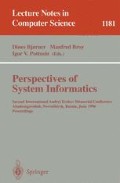Abstract
This paper relates two prominent models of concurrent computation, namely Actors and π-Calculus. We build on a tangible thesis that proclaims — Actors enact the role of a coordinating model of computation. We enrich the Actor model by defining mechanisms for achieving higher levels of abstraction. This helps in reasoning with collections of Actors termed Actor Troupes. We identify a notion of observation equivalence between Actor Troupes; and provide a firm semantic foundation for the enriched Actor model, in terms of the π-calculus — which has emerged as the canonical process calculus for the semantic analysis of object-based concurrent systems. Further, we show that the algebraic notion of weak reduction equivalence in π-calculus, corresponds precisely to observation equivalence of the corresponding Actor Troupes.
Preview
Unable to display preview. Download preview PDF.
References
Agha, G.: Actors: A Model of Concurrent Computation in Distributed Systems, MIT Press, Cambridge Mass., 1987.
Agha, G.: Supporting Multiparadigm programming on Actor Architectures, Proc. PARLE'89, LNCS (1989).
Agha, G., Callsen, C.J.: ActorSpace: An Open Distributed Programming Paradigm, Proc. PPOPP'93, ACM Press (1993) 23–32.
Agha, G., Mason, I.A., Smith, S., Talcott, C.: Towards a theory of Actor Computation, Proc. CONCUR'93, LNCS 715 (1993). Full version in J. of Functional Programming 1 (1993).
Andreoli, Pareschi,: Objects Meet Rules: from Communication to Coordination through Declarativity, Proc. COORDINATION'94.
Baude, F., Vidal-Naquet, G.: Actors as a Parallel Programming Model, Proc. STACS'91, LNCS 480 (1991).
Berry, G., Boudol, G.: The Chemical Abstract Machine, TCS 96 (1992) 217–248.
Boudol, G., Asynchrony and the π-calculus, Research Report 1702, INRIA (1991).
Clinger, W.: Foundations of Actor Semantics, AI-TR 633, MIT (1981).
Hewitt, C., Baker, H.: Laws for Communicating Parallel Processes, Proc. IFIP (1977) 987–992.
Hewitt, C., Bishop, P., Sterger, R.: A Universal Modulator Actor Formalism for Artificial Intelligence, Proc. IJCAI'73 (1973) 235–245.
Honda, K., Tokoro, M.: A Small Calculus for Concurrent Objects, OOPS Messenger 2 (1991) 50–54.
Honda, K., Tokoro, M.: An Object Calculus for Asynchronous Communication, Proc. ECOOP'91, LNCS 512 (1991).
Jones, C.B.: A pi-calculus Semantics for an Object-Based Design Notation, Proc. CONCUR'93, LNCS 715 (1993).
Milner, R.: Communication and Concurrency, Prentice Hall (1989).
Milner, R.: The polyadic π-calcalus: a tutorial, Logic and Algebra of Specification, Springer-Verlag (1993).
Milner, R., Parrow, J., Walker, D.: A calculus of mobile processes (Parts I and II), Information and Computation 100 (1992) 1–77.
Milner, R.: Functions as processes, Research Report 1154, INRIA (1990).
Milner, R., Sangiorgi, D.: Barbed Bisimulation, ICALP'92, LNCS 623 (1992).
Nierstrasz, O.: Towards an Object Calculus, Object-Based Concurrent Computing, ECOOP'91 Workshop, LNCS 612.
Papathomas, M.: A Unifying Framework for Process Calculus Semantics of Concurrent Object-oriented Languages, ECOOP'91 Workshop, LNCS 612.
Raja, N., Shyamasundar, R.K.: Actors as a Coordinating Model of Computation, TIFR Research Report, Bombay (1995).
Sangiorgi, D.: From pi-calculus to higher-order pi-calculus and back, Proc. TAP-SOFT'93, LNCS 668 (1995).
Pierce, B.C., Turner, D.N.: Concurrent Objects in a Process Calculus, Proc. TPPP'95, LNCS 907 (1995).
Pierce, B.C., Turner, D.N.: Pict: An Experiment in Concurrent Language Design, Tutorial Notes (1995).
Thomsen,B.: Calculi for higher-order communicating systems, Ph.D. thesis, Imperial College, London University (1990).
Vaandrager, F.W.: Process algebra semantics of POOL, Applications of Process Algebra, CUP (1990).
Vasconcelos, V., Tokoro, M.: Trace Semantics for Actor Systems, Object-Oriented Concurrent Computing, ECOOP'91 Workshop, LNCS 612.
Walker, D.: π-Calculus Semantics of Object-Oriented Programming Languages, Proc. TACS'91, LNCS 526 (1991).
Walker, D.: Objects in the π-Calculus, Information and Computation 116 (1995) 253–271.
Author information
Authors and Affiliations
Editor information
Rights and permissions
Copyright information
© 1996 Springer-Verlag Berlin Heidelberg
About this paper
Cite this paper
Raja, N., Shyamasundar, R.K. (1996). Actors as a coordinating model of computation (extended abstract). In: Bjørner, D., Broy, M., Pottosin, I.V. (eds) Perspectives of System Informatics. PSI 1996. Lecture Notes in Computer Science, vol 1181. Springer, Berlin, Heidelberg. https://doi.org/10.1007/3-540-62064-8_17
Download citation
DOI: https://doi.org/10.1007/3-540-62064-8_17
Published:
Publisher Name: Springer, Berlin, Heidelberg
Print ISBN: 978-3-540-62064-8
Online ISBN: 978-3-540-49637-3
eBook Packages: Springer Book Archive

